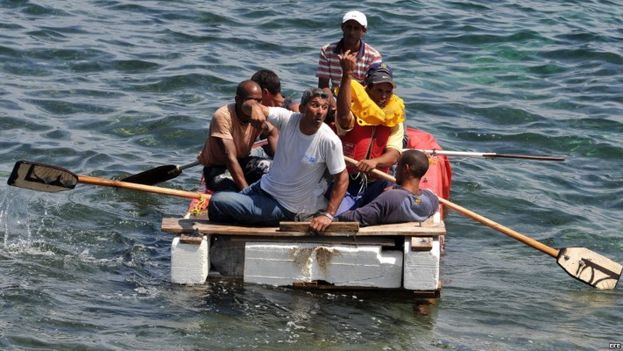
![]() 14ymedio, Havana, 13 January 2017 — Matilde sold her home just two weeks ago to pay for the immigration route to the United States. Thursday, the hope of achieving her dreams burst when president Barack Obama put an end to the wet foot/dry foot policy that granted legal residency to Cubans who reached the United States.
14ymedio, Havana, 13 January 2017 — Matilde sold her home just two weeks ago to pay for the immigration route to the United States. Thursday, the hope of achieving her dreams burst when president Barack Obama put an end to the wet foot/dry foot policy that granted legal residency to Cubans who reached the United States.
The news dropped like a bombshell on the island. “My family is desperate, having put all their hopes in this journey,” the retired woman told 14ymedio. With a son living in New Jersey, the woman planned to travel at the end of this month to Mexico and cross the border “to the land of freedom.”
Since the death of former president Fidel Castro, no other event has so shaken the Cuban reality. The announcement this Thursday affected many who normally live their lives outside politics and official issues. “I feel as if someone had snatched away my lifejacket in the middle of the sea,” said Matilde.
Attorney Wilfredo Vallín, of the Cuban Legal Association, believes that the decision is “something that belongs to the sovereignty of a State.” In 1995, during the Bill Clinton administration, the policy was approved that today “is considered opportune to change,” but “the repercussions of that in other countries is a problem of other governments.”
“It has been said that these facilities provided by the US Government encouraged emigration and now a part of the argument is over”
The attorney maintains that what happened transcends the issue of migration and touches the pillars of the ideological propaganda of the Plaza of the Revolution. “It has been said that these facilities provided by the US government encouraged emigration and now that part of the argument is over.” For Vallín the decision could “increase discontent among citizens.”
The end of this immigration policy comes at a bad time for the government of Raúl Castro. Last year closed with a stagnant economy that experienced a fall of 0.9% in the Gross Domestic Product (GDP). For those most affected by hardship and the high cost of living, the possibility of emigration to the United States was a source of permanent illusion.
However, the ruling party has welcomed a new era. Josefina Vidal, the director general for the United States in Cuba’s Ministry of Foreign Affairs, told the national media that with this suspension, “the migration crisis between Cuba and the United States is eliminated.” The end of the wet foot/dry foot policy has been a old demand of the government of the island, which has also pressed to end the Parole program for Cuban health professionals, a measure that was also suspended this Thursday.
“With these measures, Cubans who believed they could find prosperity and wellbeing in the United States will have to find another solution,” reflects opposition leader José Daniel Ferrer, leader of the Cuban Patriotic Union (Unpacu).
In a telephone conversation with this newspaper from eastern Cuba, Ferrer says now begins a stage of “thinking more about how to obtain freedom, prosperity, opportunities and rights here in our own land.” The scenario that opens “will make us much more responsible and aware that we must take the reins of our destiny as a people and as a nation here within.”
In front of the University of Havana, Ramon, 48, reflects on the possible repercussions of what happened. “Every time the popular disagreement reached a high point, the government managed to calm it by opening up emigration,” he says. “Now we are all unable to get out of this pressure cooker that is always getting hotter.”
“Political refugee status is too serious, too honorable for it to continue to function as it has until now”
Activist Eliécer Ávila, leader of the Somos+ (We Are More) movement, considers it an “excellent” decision. “The refugee status for political reasons is something too serious, too honorable for it to continue to function as it has so far,” he reflects. “Any measure that makes Cubans take more responsibility for their nation instead of fleeing it is something that should be supported.”
For opposition member Manuel Cuesta, a member of the Democratic Action Roundtable (MUAD), the elimination of this policy “should have been taken long ago to avoid the type of risky emigration that has resulted in the loss of the lives of young people, children and whole families.”
He acknowledges, however, that the decision is “controversial because those who were preparing their raft to leave early this morning have just been dissuaded in a way that cannot be appealed.” It is likely that “Trump is applauding the measure,” he said.
